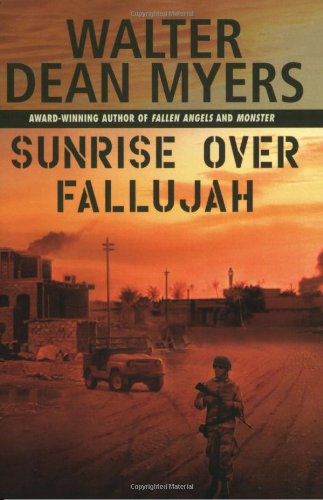All Nonfiction
- Bullying
- Books
- Academic
- Author Interviews
- Celebrity interviews
- College Articles
- College Essays
- Educator of the Year
- Heroes
- Interviews
- Memoir
- Personal Experience
- Sports
- Travel & Culture
All Opinions
- Bullying
- Current Events / Politics
- Discrimination
- Drugs / Alcohol / Smoking
- Entertainment / Celebrities
- Environment
- Love / Relationships
- Movies / Music / TV
- Pop Culture / Trends
- School / College
- Social Issues / Civics
- Spirituality / Religion
- Sports / Hobbies
All Hot Topics
- Bullying
- Community Service
- Environment
- Health
- Letters to the Editor
- Pride & Prejudice
- What Matters
- Back
Summer Guide
- Program Links
- Program Reviews
- Back
College Guide
- College Links
- College Reviews
- College Essays
- College Articles
- Back
Sunrise Over Fallujah by Walter Dean Myers
War through the eyes of an 18 year old African American soldier is told in Sunrise Over Fallujah by Walter Dean Myers, an African American Fiction Genre, copyright 2008.
Robin “Birdy” Perry joins the army after September 11th and is sent to Iraq. Robin and his squad, men and women, are assigned to Civil Affairs. They are there to help the Iraqi people during the war.
I would recommend this book to middle school students because it shows a view of war from the viewpoint of someone on the front line who is only 4 or 5 years older than the reader, our future soldiers. Readers learn what it is like living through actual fighting and not just reading about it in the news or seeing it on TV.
Birdy starts out with a naive view of war. “It was almost like getting ready for a basketball game, reassuring ourselves that we were cool, that we were going to win.” (page 25). Birdy’s first glimpse of death wasn’t even of a soldier, but of a young Iraqi boy. “I walked away. Away from the house, away from the body, away from the grandmother. The buildings across the street, the soldiers moving cautiously past them, were unreal through my tears. It was a horror movie badly out of focus, with only the images in my head crystal clear.” (page 57). After a few months in Iraq, Birdy’s view of death and killing change. “The thing was that killing was taking on a different meaning to me.” “...now I was willing to kill because I was afraid of being killed, willing to kill people I had never met...had never wanted to hurt me. But I was afraid and so I would kill.” (page 213). Finally after several months in Iraq, Birdy and his crew are sent their separate ways to recover from wounds and on to new assignments.
Birdy writes to his uncle about his thoughts of war. “If I ever have kids, I think I won’t tell them much about what I did here, or what I’ve seen. I’ll tell them something because I’ll want them to know about war. But are there really enough words to make them understand?”. (page 282). Does anyone ever understand war?
Similar Articles
JOIN THE DISCUSSION
This article has 0 comments.

